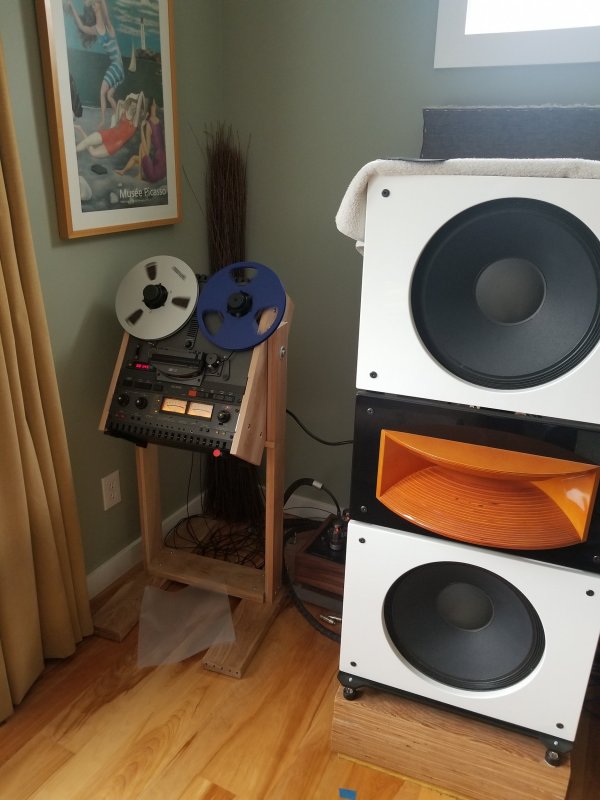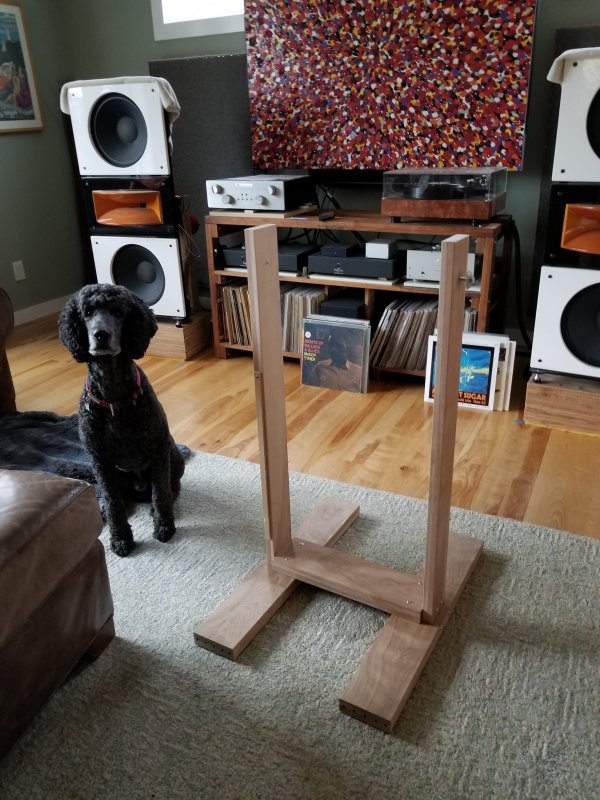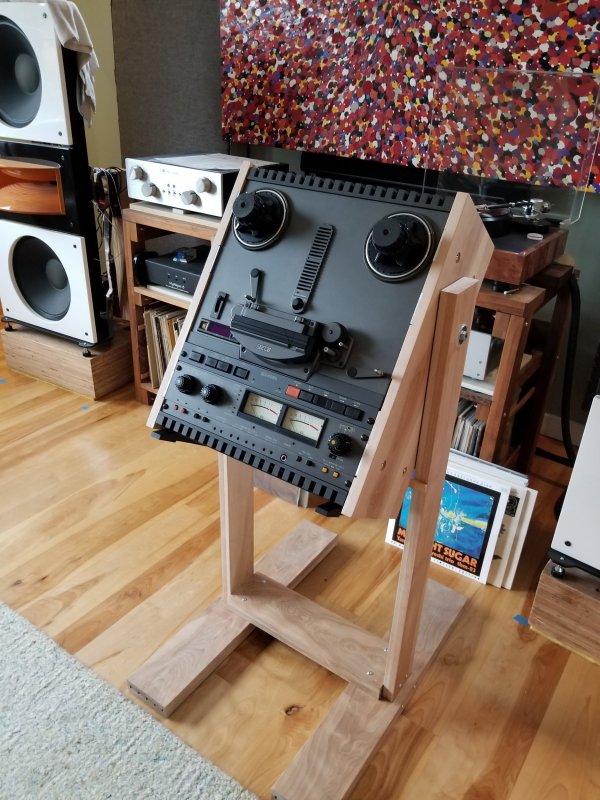Like Leif. I dub from a modded A80RC to a Nagra IVS and I have not be able to hear any difference in my system.
If tape is so good why does it record so poorly?
- Thread starter Kingrex
- Start date
You are using an out of date browser. It may not display this or other websites correctly.
You should upgrade or use an alternative browser.
You should upgrade or use an alternative browser.
Leif is 100% correct - all those opamps in the signal path are detrimental to the sound. A820 is indeed the pinnacle of R2R development... when it comes to its mechanism. But I will take the discrete circuit any day, and for dubs I will use the tube head preamp as the source.
IMHO we can´t ignore the Ampex ATR100's and ATR102's in this top list. Although I have no experience with such machines, many experts consider them to be the top.Leif is 100% correct - all those opamps in the signal path are detrimental to the sound. A820 is indeed the pinnacle of R2R development... when it comes to its mechanism. But I will take the discrete circuit any day, and for dubs I will use the tube head preamp as the source.
I wanted to have my.preamp boards rebuilt. I found a tech who could do it, but he is out of state and only wants the board. I don't know which is the output board and they are all soldered in there.
Gene Walls who rebuit my deck says the Otari 5050 is excellent as is. I can wire the heads out no problem, but he feels I am getting into big $$$ for a small gain. He advises, get good source tapes. I have some Ultra Analog and Internationa Phono and others. They are all very nice. Different from my very good analog and digital.
Gene also said do not put the bottle head rollers on the Otari. The friction over the tensioners is calibrated into the motors. If you remove that friction, the motors are not able to control the tape speed properly. I have never heard of anyone who can reprogram the software or whatever handles that whole functional change.
What I would love is an aftermarker library rewind. Since all my tape are tails out, I have to rewind for every start. Its always a crap shoot if I will overshoot or undershoot the start. And its so darn fast. It just appears as if intense fruction must occur on the rewind lifters. And the tension on the tape must be somewhat inconsistent at those speeds.
Any help on good tech in WA or OR state.
Gene Walls who rebuit my deck says the Otari 5050 is excellent as is. I can wire the heads out no problem, but he feels I am getting into big $$$ for a small gain. He advises, get good source tapes. I have some Ultra Analog and Internationa Phono and others. They are all very nice. Different from my very good analog and digital.
Gene also said do not put the bottle head rollers on the Otari. The friction over the tensioners is calibrated into the motors. If you remove that friction, the motors are not able to control the tape speed properly. I have never heard of anyone who can reprogram the software or whatever handles that whole functional change.
What I would love is an aftermarker library rewind. Since all my tape are tails out, I have to rewind for every start. Its always a crap shoot if I will overshoot or undershoot the start. And its so darn fast. It just appears as if intense fruction must occur on the rewind lifters. And the tension on the tape must be somewhat inconsistent at those speeds.
Any help on good tech in WA or OR state.
I thought about responding to the opamp vs discrete circuit comments above, but it belongs in another thread. I have both 'TOTL' opamps in various components and discrete opamps from Burson and another company used in modified components. All I can conclude is that the whole circuit design needs to be evaluated as a whole from power supply to capacitors to resistors. I think the capacitors, if any, in a circuit have more influence than an opamp.
Wish I could get a mod like that on my Otari.I dub from one MTSL modded A80RC
best
Leif
Mike, I really know nothing about decks other than what others tell me. Gene knows his stuff and is not the only person to tell me the motors on the Otari are not tuned to handle 0 friction on the tensioners. I have also been scolded by a few tape friends. They advise I clean my tape path after every play. This may be excessive with new production tapes, but I get the point. I now look at my heads every day before play and clean them. Hence the stand I built. It loads great as shown and easily tilts up further for access to the heads.
Attachments
On stands"
Functional and economical stand
If you are like me, you constantly struggle with how to arrange your multiple decks in your listening room. I have some decks that are designed to be floor standing, and some that came with their own brand name stands. That is fine. But what to do with a nice deck that has no stand? Yes...
www.tapeheads.net
I guess I’m confused, these R2R machines all have a record feature and with multiple inputs to plug in various source.
If I were to plug in a SACD player and record a disc on a calibrated machine then why would it not at minimum pickup the same level of playback quality and range?
From my understanding today’s tape is far superior in playback from previous generations including longer life. So back to if you have a calibrated machine, that is maintained then why does it not work?
Note: I’m not talking from a monetary value where a SACD is cheaper to playback but only from a SQ perspective.
If I were to plug in a SACD player and record a disc on a calibrated machine then why would it not at minimum pickup the same level of playback quality and range?
From my understanding today’s tape is far superior in playback from previous generations including longer life. So back to if you have a calibrated machine, that is maintained then why does it not work?
Note: I’m not talking from a monetary value where a SACD is cheaper to playback but only from a SQ perspective.
If I were to plug in a SACD player and record a disc on a calibrated machine then why would it not at minimum pickup the same level of playback quality and range?
Because every tape machine has its own sonic signature, that it will impart on the sound. Some are less intrusive, and will give you a near-perfect copy, others will damage the sound in very obvious ways.
Unfortunately, the severity of that degradation does not correlate to the brand recognition or the machine price.
How much impact does the sending source have to the overall accuracy of a duplicatuon. I get anything lost is lost.Because every tape machine has its own sonic signature, that it will impart on the sound. Some are less intrusive, and will give you a near-perfect copy, others will damage the sound in very obvious ways.
Unfortunately, the severity of that degradation does not correlate to the brand recognition or the machine price.
Which has a greater impact on tape duplication accuracy. The source machine or record machine.
From digital to tape
From tape to tape
It is the same old weak link situation, you will be hearing mostly the worst component in the chain
To me this is a cop out answer. I have an assumption that some parts of a tape machines circuitry is more difficult to design and implement.
Total assumption on my part. Receiving a signal and recording it seems to me to be a more complex process than reading a signal and sending it. You will capture any errors, but how much error is there in a digital signal. How much in the tape signal. I guess I am back to questioning how good are stock Otari, Technics, Teac outputs.
How about another way. If you had a studor and an Otari. Which would you record onto. I bet you would say send from the Otari and record on the Studer. But I really don't know. Someone may correct me and say I have it the wrong way.
I had an "all outed" The Tape Project Otari 5050mkII and now I have 2 MTSL A80RC for this very reason....
the chassis and the mechanics of the A80 or some other studio machines, should not be underestimated
the chassis and the mechanics of the A80 or some other studio machines, should not be underestimated
Hardly a cop out... more something based in hard experience. Having designed pretty much every item you mentioned, I can assure you that bad job can be done at any stage along the way. OTOH, designing them well is also not exactly rocket science. However, other priorities often enter the equation - such as cost, marketing focus, darn features, etc.
Your Otari/Studer example has no simple answer, as not every Otari, and not every Studer are the same. In my particular case it is easy - I use the Otari with an external head preamp as the source, and record on Studer A80 (there are other options here too). Definitely NOT the other way around, but my case is just my case.
Your Otari/Studer example has no simple answer, as not every Otari, and not every Studer are the same. In my particular case it is easy - I use the Otari with an external head preamp as the source, and record on Studer A80 (there are other options here too). Definitely NOT the other way around, but my case is just my case.
If in truth your career was in audio equipment design and you are intimate in your knowledge, then I degress. I accept your answer.Hardly a cop out... more something based in hard experience. Having designed pretty much every item you mentioned, I can assure you that bad job can be done at any stage along the way. OTOH, designing them well is also not exactly rocket science. However, other priorities often enter the equation - such as cost, marketing focus, darn features, etc.
Your Otari/Studer example has no simple answer, as not every Otari, and not every Studer are the same. In my particular case it is easy - I use the Otari with an external head preamp as the source, and record on Studer A80 (there are other options here too). Definitely NOT the other way around, but my case is just my case.
2 MTSL A80RC for this very reason....
I don't know what modifications they perform, but that is certainly the right Studer model to pick.
Would it be possible to share the information on their rework?
(...) From my understanding today’s tape is far superior in playback from previous generations including longer life. (...)
Do you have any references on this interesting subject?
Similar threads
- Replies
- 2
- Views
- 578
- Replies
- 7
- Views
- 353
- Replies
- 3
- Views
- 634
- Replies
- 16
- Views
- 2K
- Replies
- 6
- Views
- 1K
| Steve Williams Site Founder | Site Owner | Administrator | Ron Resnick Site Owner | Administrator | Julian (The Fixer) Website Build | Marketing Managersing |




